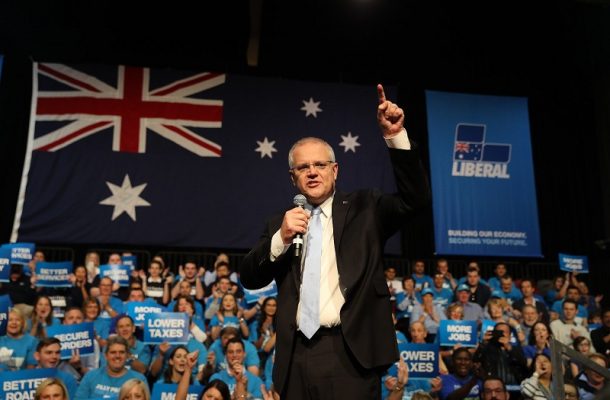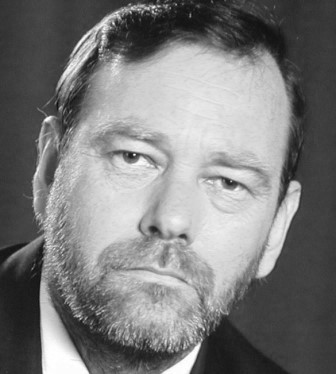Hail, the President of Parliament

In Australia’s presidential-style election, the sitting president has amazed the nation—and himself—by winning.
Scott Morrison expressed his own surprise at the start of his victory speech: ‘I have always believed in miracles … and tonight we’ve been delivered another.’
A government that trailed in every opinion poll conjured a come-from-behind salvation it can parade as a famous victory. Morrison’s title is prime minister, but he did it the presidential way.
Pause to note a dynamic taken for granted by the happy residents of the lucky country—the brutal elegance of Oz democracy.
The job was done in an evening. Nations as diverse as the US and Indonesia can only gawk at the speed.
Our polls closed at 6 pm and counting started. By 9.30 pm eastern time, the ABC declared that the Liberal–National government would be re-elected.
At 11.30 pm, Bill Shorten emerged to concede defeat and step down as Labor leader. Few things so graced Shorten’s leadership as his manner in leaving it. On the hardest of nights, he offered a gracious, positive speech about Australia’s future and the Labor Party: ‘We can’t change the past, but my word we can change the future!’
By midnight, ScoMo (the designation Scott Morrison uses on Facebook) was on stage revelling in his miracle. Whether the final seat count delivers him a minority government or a razor-slim majority mattered nought. Rightly so. In this game—taking government, wielding power—a win is a win.
At the G20 in Osaka next month and in Asia’s summit season later this year, ScoMo will be present in his own right—the elected leader who dominates his government with a victor’s authority.
At the G20 this time, German Chancellor Angela Merkel won’t need a cheat sheet to remind her of the identity of the latest leader to emerge from the revolving door of the Australian prime ministership.
Indeed, rule changes mean the revolving-door decade of prime ministerial fratricide is over. That sorry decade taught tough lessons: the four previous prime ministers were each dispatched by their own party rooms (although Kevin Rudd in his brief second coming as PM was also discarded by the voters).
Little wonder Australians expressed cynicism and disillusionment at the chaotic, cannibalistic antics of the two parties.
In the pragmatic way of Oz, the Labor and Liberal parties have done a fix, changing their rules to graft presidential protections atop the rights of the party room. The significant presidential habits that have evolved in our Westminster-based system are now reflected in the leadership protocols of the main parties.
In his last great gift to Labor in his second PM stint, Rudd changed the rules so it’s virtually impossible for the caucus to topple the leader between elections. When ScoMo stepped over Malcolm Turnbull’s political corpse, he did the same for the Liberals.
The protocols mean the presidential graft has even stronger purchase on the Australian prime ministership.
The international message to our neighbours and friends is that the days of Canberra as a leadership coup capital are over.
President/PM ScoMo will lead the country for the next three years, barring personal mishap or defeat in a substantive vote in the House of Representatives. And the last time an Australian government fell in a House of Reps vote was during World War II.
The recent experience of minority government under Julia Gillard and Turnbull has taught both sides how to dance on the Reps razor edge: show proper respect for the those on the cross benches, relying on the sanction that independents who topple a government will bring on an early election that could end their own careers.
The presidential nature of the system was at the heart of Morrison’s campaign. He presented the contest as one between presidents, not parties: ‘If you vote for Bill Shorten, you’ll get Bill Shorten. If you vote for me and the Liberal and National parties you will get me to serve you as your prime minister.’
The Australian electorate didn’t warm to Shorten during his six years as Labor leader. The blood splatters on his toga from plunging the knife into two Labor prime ministers defined his image as an ambitious apparatchik.
In a fine meditation on Shorten’s leadership on election eve, journalist Laura Tingle got at the nature of that voter ambivalence with this paragraph quoting the cheerily pragmatic judgement of a former Labor colleague: ‘[Shorten] is a completely disingenuous lying bastard whose ambition knows no bounds. However, none of these things stop you being a prime minister, or for that matter, a good prime minister. In fact, they are probably job qualifications.’
Like Shorten, Morrison started out as a party apparatchik. Yet in this election, ScoMo put on his baseball cap and campaigned with relentless energy and driven focus to embrace and uplift ‘the quiet Australians’. That, plus his drumbeat about the dangers posed by Labor did the trick—or delivered the miracle.
Australia has witnessed the rebirth—with a huge enlargement of power within the Liberal Party—of the sitting president. Plus the dispatch of Labor’s would-be president. All in an evening’s work for pragmatic, proficient Oz democracy.
This article was published by The Strategist.

Graeme Dobell has been reporting on Australian and international politics, foreign affairs and defence, and the Asia Pacific since 1975. He is Journalist Fellow at the Australian Strategic Policy Institute.














